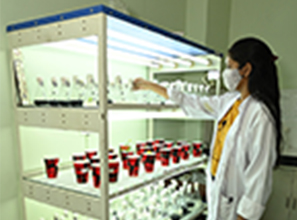
Growing a Greener Future: Advancements in Plant Biotechnology Research
Plant biotechnology is a rapidly growing field that is revolutionizing the way we think about plant growth and productivity. Plant research is of vital importance to our society, as it plays a critical role in ensuring food security, promoting sustainable agriculture, and addressing global challenges such as climate change and environmental degradation. Here are some of the key research domains we are working at Dr B Lal Institute of Biotechnology:
Plant Tissue Culture: Through the use of innovative techniques such as Plant tissue culture which involves growing plant cells, tissues, and organs in a sterile environment, we are doing micropogation of medicinally important plants. This powerful tool is used for a variety of purposes like the conservation of rare and endangered plant species, and the propagation of high-value plant species.
Sustainable farming with use of Vermicompost extract: Vermicompost is an organic fertilizer that is produced by the decomposition of organic matter by earthworms. This nutrient-rich substrate is widely used in agriculture and horticulture to enhance plant growth and productivity. In addition to providing essential nutrients, vermicompost also contains beneficial microorganisms that can improve soil health and suppress plant diseases. We are exploring new and innovative ways to use vermicompost in various experimental approaches, such as using vermicompost extracts to enhance plant growth and abiotic stress tolerance.
Cultivation of plants using Spent Mushroom Substrate: Spent mushroom substrate (SMS) is a byproduct of mushroom cultivation that is rich in nutrients and organic matter. We are exploring the potential uses of SMS in plant growth and sustainability. Studies have shown that SMS can be used as a substrate for growing plants, as it contains beneficial microorganisms and nutrients that can promote plant growth and productivity. By harnessing the power of SMS, we are developing sustainable approaches to plant growth that reduce waste and improve soil health.
Research on Microgreens: Microgreens are a type of vegetable that are grown from the seeds of various plants. They are harvested at an early stage of growth, when they are just a few inches tall. Microgreens are a popular food item due to their high nutritional value and flavorful taste. We are exploring the use of vermicompost and other organic fertilizers to enhance the growth and nutritional quality of microgreens, as well as studying the biochemical pathways that underlie their growth and development.
Read more: Biotechnology for improving food and agriculture
Organic Farming: Organic farming is a method of agriculture that emphasizes the use of natural inputs and ecological processes to produce food. We have a small organic garden which uses practices such as crop rotation, composting, and natural pest control methods to promote soil health and biodiversity, reduce the use of synthetic fertilizers and pesticides, and minimize the impact of farming on the environment. Organic farming is not only beneficial for the environment, but also for human health, as it produces food that is free of harmful chemical residues. Hydroponics:
Hydroponics: Hydroponics is a method of growing plants without soil, using nutrient-rich water instead. This technique allows plants to grow in a controlled environment, where the amount of water, nutrients, and light can be precisely controlled. We have a small experimental level hydroponics unit, which is been used for growing of plants and training purpose of the students. Hydroponics can also be used to grow crops in urban areas, where space is limited, and soil quality is poor.
Phytoremediation: Phytoremediation is the use of plants to clean up contaminated soil and water. This technique involves growing plants that have the ability to absorb and accumulate contaminants such as heavy metals, pesticides, and organic pollutants, from the soil or water. Phytoremediation is a sustainable and cost-effective method of cleaning up contaminated sites, as it avoids the need for expensive and energy-intensive cleanup methods. We are involved in research of phytoremediation of heavy, metals like Mercury, Cadmium from soil using different plants.
In conclusion, plant biotechnology is a dynamic and exciting field that is advancing our understanding of plant growth and sustainability. All these are important fields in plant science that contribute to sustainable agriculture, environmental conservation, and human health. These fields of study are essential for developing new and innovative ways to grow crops, clean up contaminated sites, and improve the health of our planet and our communities. As we continue to face challenges such as climate change, food insecurity, and environmental degradation, these fields of study will become increasingly important for creating a more sustainable and resilient future.
- Learn about the key cutting-edge methods employed in plant biotechnology. You can learn more about plant biotechnology techniques at the Dr. B. Lal Institute of Biotechnology
Made it this far? That means you're curious—and we love that! Ready to test your passion for biotechnology? Click below to find out 👇🏻
Biotechnology Aptitude Test




Your email address will not be published. Required fields are marked *